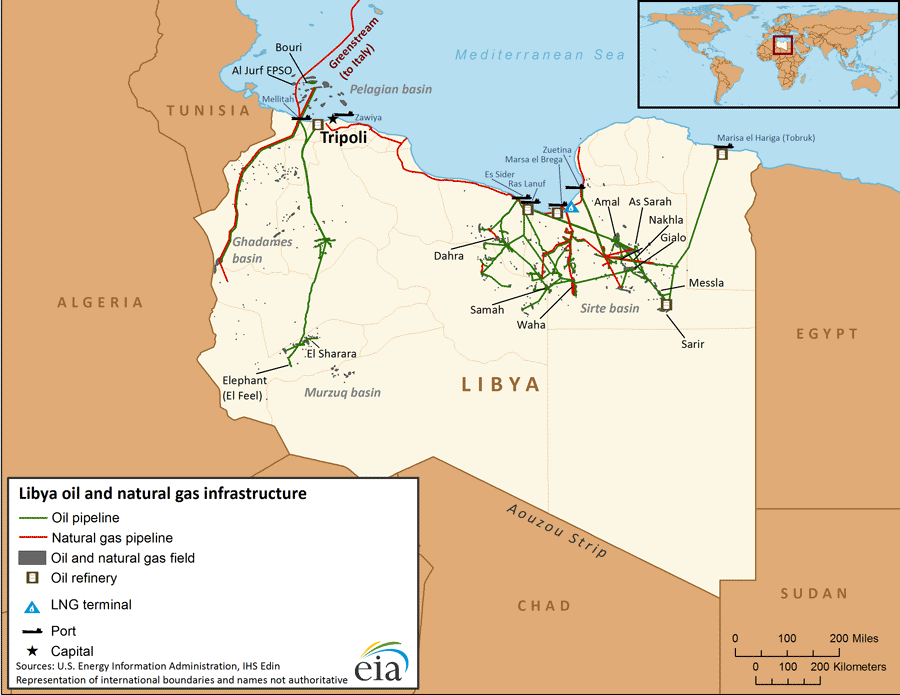Haftar’s quest for oil dominance
April 27, 2019 | Expert Insights
Much of Libya’s civil war has focused on control of the nations’ airports. Why have rival factions concentrated on securing Libya’s airports? What is the Haftar offensive’s endgame in securing Libya’s last functioning airport?
Background
Khalifa Belqasim Haftar is a Libyan military officer and the head of the Libyan National Army, currently engaged in the Second Libyan Civil War. He was appointed as the head by the elected legislative body or the Libyan House of Representatives. Backed by France, the United Arab Emirates (UAE) and Egypt, Mr. Haftar launched a military campaign against what he called "terrorists" in Tripoli. Libya’s interim government, (the UN recognised Government of National Accord (GNA)) controls much of the capital, Tripoli. Tripoli contains the nations’ last functioning airport, in addition to a strategic port and Libya’s largest commercial and manufacturing centre. The Haftar campaign has been met with staunch resistance by militias loyal to the GNA.
Libya is deeply involved in smuggling, trafficking and extortion. Libya’s legitimate businesses are focused on its vast natural resources - it has the ninth-largest reserves of oil, using these to boost its economic and geopolitical standing.

Analysis
Libya is divided into three distinct geographic regions that makes it challenging for any force to assert complete control. The nations’ lack of year-round rivers and lakes means that water and food are hard to come by. It's land borders present no natural geographic boundaries; much of the country’s ability to coalesce is based on its long coastline. This coastline has been key in facilitating Libya’s economic progress; it is home to ports that allow the dispersal of oil resources sourced from the nation’s southern fields.
Since the fall of Libya’s former dictator, Muammar al-Qaddafi, airports have been the centre of focus for the nation’s civil war. Libya’s airports provide those who control them the ability to effectively project their power across the whole country. This is particularly important given the country’s geography. Libyan airports have been critical in facilitating arms transfers and military assistance. The airports also serve as hubs for trafficking, extortion and extra-judicial detentions, allowing those who control them a steady stream of income. Tripoli’s main airport was rendered unusable throughout the civil war. In turn, a smaller airport, located just outside of Tripoli became the only functioning international airport in the nation. The airport sits strategically positioned with reference to the nation’s western oil terminals, Tripoli’s port and weapons depots, as well as key bridges and roads. The Haftar offensive has focused much of its efforts in regaining control of this airport.
Haftar’s actions point to his belief that a unified military command with a strong leader is the only way to solve Libya’s challenges. In order to facilitate this unification, Haftar seeks to secure the entirety of Libya, including the nation’s capital. His rival, the GNA, is boosted by support from Turkey and Qatar. Much of this support takes the form of armaments and training. The GNA would be unable to sustainably procure the weaponry they need without their control of Tripoli’s airport. In order to cut off the GNA’s supply route and its financial income, the Haftar offensive seeks to gain control of the GNA’s last remaining airport. Additionally, Haftar will be able to take better advantage of French, Egyptian and Emirati support by using the airport in a similar manner that the GNA does - for arms.
A recent report suggests that Libya’s oil production and exports are at their highest levels since 2013. Analysts believe that this number is likely to increase so long as fighting does not spread to oil fields and ports. The airports’ position next to Tripoli’s port and its oil terminals means that through power controlling it is able to gain income from the sale of Libya’s oil, a position Haftar seeks to secure for himself. If Haftar is able to secure Tripoli’s oil terminals, his faction will effectively control the entirety of Libya’s oil production. Securing Tripoli’s airport is the first step in achieving this tactical position.
Counterpoint
Haftar’s Libyan National Army (LNA) has stretched its supply lines in an effort to capture Tripoli. The size of the LNA relative to the portion of Libya it controls is inadequate. Currently, three key conduits - Juffra (central Libya), Garyan (south of Tripoli) and Zintan (south of Tripoli) are the main weaknesses of the LNA. The GNA can ease pressure on the besieged airport by a pincher movement that would entrap LNA forces engaged at the airport. Haftar’s push to the airport would stop in its tracks; the LNA’s supply routes are paramount to its success before it can fight for the airport.
Assessment
Our assessment is that the Haftar offensive is geared towards securing the LNA’s financial base while cutting off the income of the GNA. In our estimation, the last remaining airport in Libya is key to eventually securing the export of the nations’ natural resources, in addition to the illicit businesses that operate there. However, we believe that the LNA sits in a precarious strategic position; the GNA can cut off its supply routes. We feel that securing supply lines is of primary importance before the larger strategic goal of capturing the airport can be achieved.








Comments